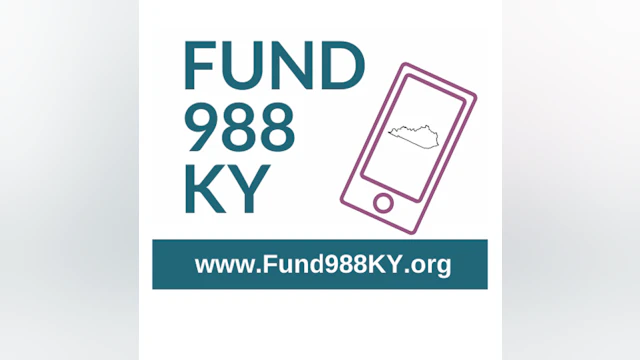Join the AFSP Kentucky Chapter and other agencies for Kentucky's Suicide Prevention Week on the Hill to advocate for HB 373 and other imoprtant mental health legislation.
FRANKFORT, KY (JANUARY 27, 2022): Rep. Kim Banta (R, Ft. Mitchell) filed House Bill 373 yesterday which will provide funding for the 9-8-8 suicide prevention and mental health crisis line to be rolled out by federal law on July 16, 2022. The bill establishes a $0.70 per line fee on cell phones which would establish the line and fund the crisis responders and crisis system of services across Kentucky.
In 2020, Congress passed the National Suicide Hotline Designation act, designating 9-8-8 as the future 3-digit phone number for the National Suicide Prevention Lifeline (NSPL). With President Trump’s signature of this unanimously-passed bill, full phone implementation and access to 9-8-8 nationally by July 16, 2022 was established. Most importantly, this act empowers states to enact laws to provide for 9-8-8 and crisis service funding in the same way that 9-1-1 is funded, through a monthly customer telephone service fee. This funding would create a full continuum of crisis care for suicide prevention and mental health, including fully-staffed local call centers answering NSPL calls and increased access to Mobile Crisis Units, Crisis Stabilization Units and other wraparound services. HB 373 is Kentucky’s chance to make mental health a priority across the Commonwealth.
The #Fund988KY movement has been working closely with the state, the community mental health centers that answer Kentucky’s NSPL calls, the 9-1-1 Emergency Services Board, and other mental health first responders from across the Commonwealth. Consistent, reliable, and permanent funding structures for the mental health crisis system in Kentucky are needed already - and that need is growing.
Nearly every Kentuckian has had their mental health impacted by the COVID-19 pandemic. There is greater awareness and decreased stigma surrounding suicide prevention and mental health care. The combination of less stigma and more stress has led to heightened call volume and increased intensity of calls to the Lifeline. According to Megan Cole, Area Director of the American Foundation for Suicide Prevention’s Kentucky Chapter, “The state of Kentucky has an important role to play in the fight to stop suicide, and it starts with having a well-funded mental health safety net.”
The vision of those planning the implementation of 9-8-8 in Kentucky is to have a person in mental health or suicidal crisis connected with a trained local counselor who can address immediate needs and can connect them to ongoing care. This will reduce healthcare spending with cost-effective early intervention, reduce the use of law enforcement and other safety resources, and meet the growing need for crisis intervention at scale. Having the NSPL calls answered locally by fellow Kentuckians - is at the heart of the #Fund988KY goal. “We know that these calls are so much more effective when answered in the state, as it allows people to immediately connect with local resources,” adds Marcie Timmerman, Executive Director of Mental Health America of Kentucky. “Call increases in our state are expected to continue to grow. We must plan now for sustainable funding to assure a sufficient workforce to answer these calls from Kentuckians.”
The fee of $0.70 per mobile phone line is the same as that charged by the 9-1-1 system. It is collected as part of the individual’s cell phone bill - or upfront when purchasing prepaid items. “The language in the bill is very similar to the law establishing the 9-1-1 system’s fees, and we are excited that Rep. Banta incorporated mental health parity into her bill in this manner”, says Sheila Schuster, Ph.D. psychologist and Executive Director of the Kentucky Mental Health Coalition.
The fee will create a permanent funding mechanism for mental health crisis response in much the same way we have permanent, consistent, and reliable funding for 9-1-1. Timmerman explains, “9-8-8 is a mental health crisis response and should be funded in the same way as 9-1-1 is funded as the physical health crisis response system.”
The fee’s generated income would be managed by a multi-stakeholder board who will monitor the operations and decide what emergency response mechanisms are needed - again repeating a similar structure that exists for the statewide 9-1-1 fund.
“Federal 9-8-8 funding isn’t consistent or long-term. If Kentucky doesn’t provide consistent funding, there is a real possibility that we will have a phone line with no one in Kentucky to answer it. Putting this fee in place now will help us build a better, faster, and more localized suicide prevention and mental health crisis response system across Kentucky,” adds Cole.
We’ve known a long time that rural Kentuckians and veterans face bigger challenges to receiving mental health services, and crisis services are not any different. “Funding 9-8-8 in this manner establishes a reliable response that Kentuckians in mental health crisis need,” adds Dr. Schuster. “At the end of the day, mental health needs must be addressed in the same way we address physical health needs, and that starts by fully funding 9-8-8.”
Contacts for this Press Release:
Megan Cole [email protected] 502-648-9451
Marcie Timmerman [email protected] 859-684-7778
More on 9-8-8 and the National Suicide Prevention Lifeline
AFSP Kentucky is focused on sufficiently funding the local community mental health centers that answer the National Suicide Prevention Lifeline calls. Join our efforts to help fully fund these centers! Learn more about our positioning as an organization here.
